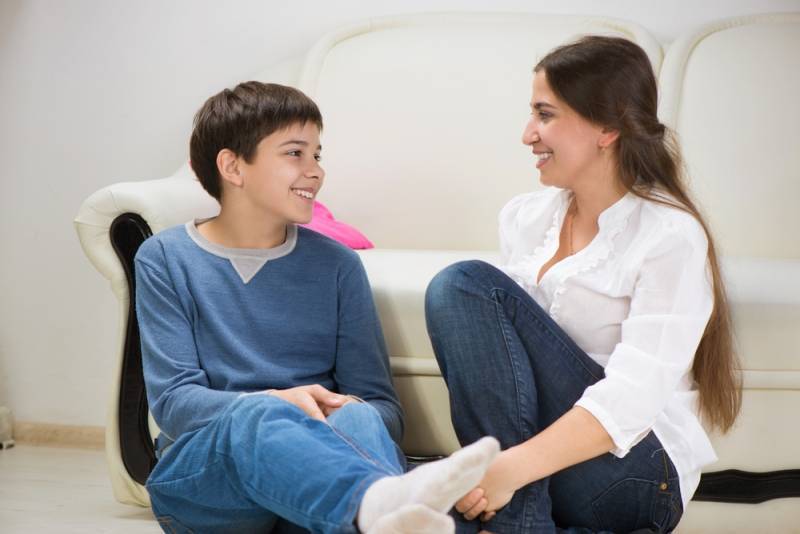Childhood is mostly thought of as that idyllic place we all yearn to go back to. Oh, those carefree and innocent days of childhood! However, think back carefully and you are sure to remember instances of pain, of hurt, of disappointment. Times when as a child, things didn’t go your way, when you were bullied or punished unfairly. And in hindsight and with the advantage of age and maturity you realise it was all small and insignificant but to your 8 or 10-year old self back then, it seemed large and overwhelming. So, while adulthood might be filled with serious responsibilities and bindings, childhood isn’t completely stress-free either.
You may also like: How to know if your child is being bullied at school?
For instance, last week, my kids had a fair at their school. My son was guitarist and vocalist for the school band that was stationed at the gate to play and sing while the Chief Guest for the event walked in. For set up and practice he was called two hours earlier than the event was due to start. They practised non-stop over and over. But when the guest of honour finally walked in (more than an hour later than schedule) he stood there and listened to them for less than 15 seconds before going inside to see the rest of the event. Nothing wrong with that. It was what anyone would expect him to do. However, to my boy who had stood on that cold winter morning for 3 hours practising, it was a huge disappointment. He was extremely upset, at the “unfairnessâ€_x009d_ of it.
My instinctive reaction was to say “Come on. Big dealâ€_x009d_ and to give him some typical motivational speech. But I held back just in time. I realised that for him it WAS a big deal. And hearing his parent say “be toughâ€_x009d_ wasn’t going to make him tough. If anything, he’d only feel reluctant to share his hurts and disappointments with me in the future.
You may also like: How to raise empathetic kids
We all want to raise resilient kids. Kids who can deal with ups and downs, recover from setbacks in life and eventually grow into strong adults. The first step to this is to allow them to express their feelings of worry, anxiety or hurt. When we brush aside their feelings (no matter how trivial they might be), we are in effect discouraging them from being honest about what’s going on inside of them. Every child is born with a basic temperament. Some children just are more sensitive than others, and that is ok. Strong and courageous people aren’t those who don’t feel stress or fear or insecurity; they are those who recognise these feelings and are equipped to deal with them. And sometimes just feeling safe and allowed to say what you’re really feeling is a great outlet.
What can we do as parents?
While it’s natural as a parent to want to protect your child from any unfavourable situation, when you try to accommodate their every need and control their environment you’re doing them more harm than good. Overprotecting a child only increases their anxiety in the long run. For instance, when your 6-year old might want to use the elevator alone, let her. Don’t let your fear of “What if there’s a power cut when she’s inside the lift alone?â€_x009d_ stop you from giving her that freedom. Instead teach her that if the power goes off when she’s inside, she shouldn’t panic. Prepare her for what it will be like – dark and stuck for a few seconds until the backup comes on. If there’s no backup, teach her to call out for help.
You may also like: Fears we need to let go off to be better parents.
No matter how hard we try we cannot and SHOULD NOT strive to create a completely risk-free environment for our children. I have seen mothers literally running behind their young kids’ bicycles and holding them every time they are about to fall. The real world is not like that. When they drive as adults you cannot pave the roads they will drive on or control the fellow-drivers they will encounter.  So let them navigate their way around their world, even fall sometimes. Teach them instead how to get up, brush off the dirt and jump onto their bikes again.
Resilient adults are those who can manage their emotions and move on from them. And it starts from childhood. I teach my kids every day that all emotions or feelings they have are ok. It’s ok to feel angry with your teacher when you feel she gave you less marks than you deserve; it’s ok to feel hurt, disappointment, fear, jealousy… But what you do with it is up to you.
I told my son that day its ok that he felt angry and disappointed – in his shoes, I would too. And then I asked him what he wanted to do about it. I was half expecting a dramatic answer like, “I don’t want to be in this band anymoreâ€_x009d_. What he said instead was, “Let me become a great musician. They’ll regret that they missed the chance to listen to me play for freeâ€_x009d_
Full marks for resilience.
You may also like: How much it costs to raise a child in India from birth to 21
Image Source:Â The Fix
Don’t forget to follow us on Facebook, Twitter, Pinterest, Soundcloud & Instagram or subscribe to our YoutubeChannel for more information.




















